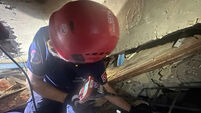Study suggests fear of results contributes to low bowel cancer screening uptake

Galway Chamber of Commerce CEO Deirdre Mac Loughlin said Picture: LinkedIn
A great fear of knowing you have cancer is one reason why uptake of bowel cancer screening is so low, a patient representative on a national study has suggested.
It emerged this week just 41% of those eligible for bowel cancer screening took up the offer last year, with the Irish Cancer Society raising alarms over this.
Galway Chamber of Commerce CEO Deirdre Mac Loughlin was involved in a separate study led by the Royal College of Surgeons Ireland. This examined the impact of changing how the invitation to screening is made.
“I think it’s a combination of fear and (this cancer) is to do with that part of the body we don’t talk about,” she said.
“But why do more women than men take the test? There has to be something there too around gender.”
The group found that making changes in the invitation letter, including using clearer language and highlighting key sentences in colour, changed attitudes.
“But they don’t think about the awful things that happen when cancer does happen. So what we wanted to do was re-phrase the letter of invitation to play down these fears.”
Changes focused on the benefits of treatment.
They added in a sentence: “Bowel cancer is one of the most common cancers in Ireland but the good news is it’s the easiest to treat if found early”, she said.
Ms Mac Loughlin added that it might not be known that 2,500 people — men and women — are diagnosed with bowel cancer every year in Ireland, and about 1,000 die.
The home-test kit is provided for free by the HSE Bowelscreen programme to people aged between 59 and 70.
The patient representatives in the study group also talked about hesitation in doing the actual test. It involves placing a small sample of stool in a tube and sending this for analysis in a freepost envelope.
“Of course people think the test is gross. And I can speak from experience because I had all those thoughts before I saw the kit,” she said.
She added however: “It’s so straightforward to do, it’s so simple.”
The RCSI study, led by Dr Nicholas Clarke, found changing how the tests are sent out could increase uptake by 6%.
He said: "By making the process easier and addressing concerns upfront, we can save more lives."










